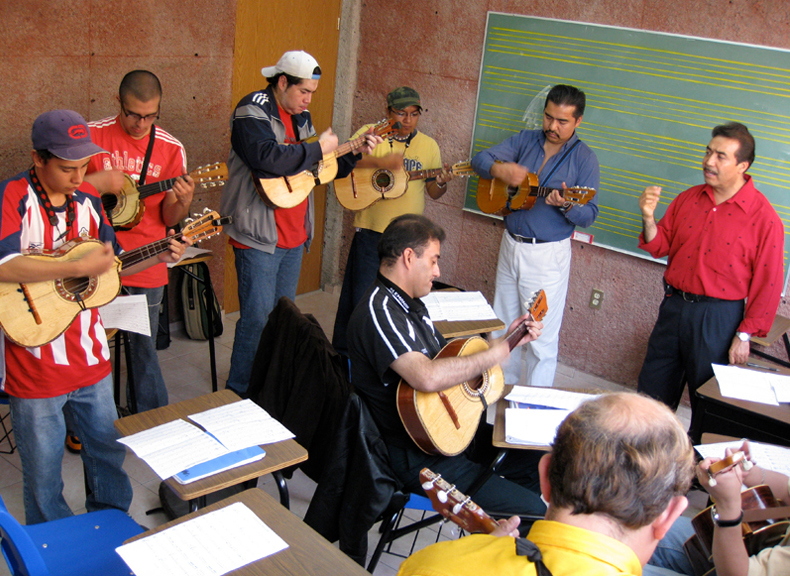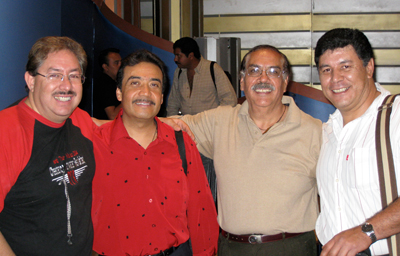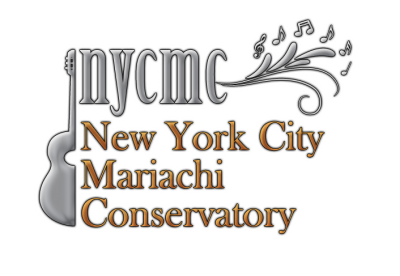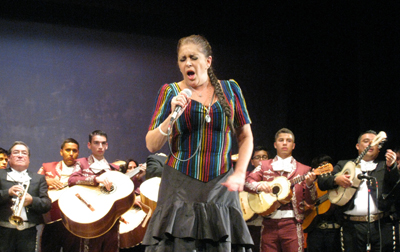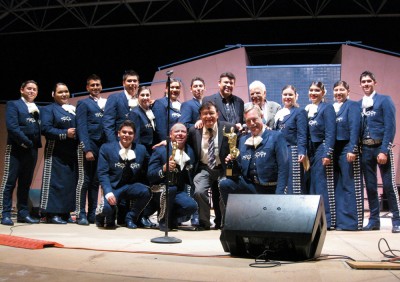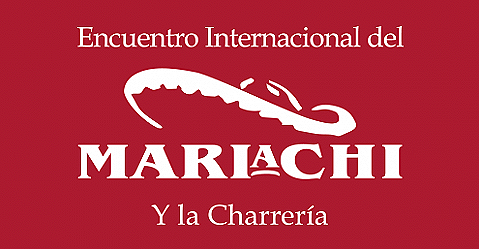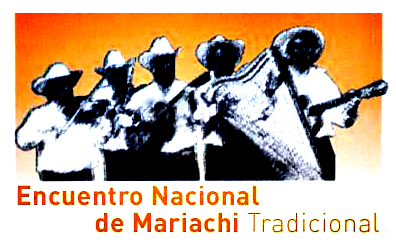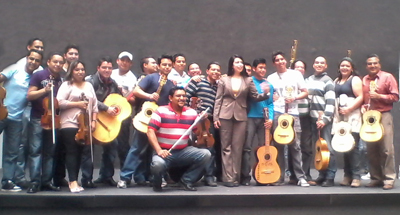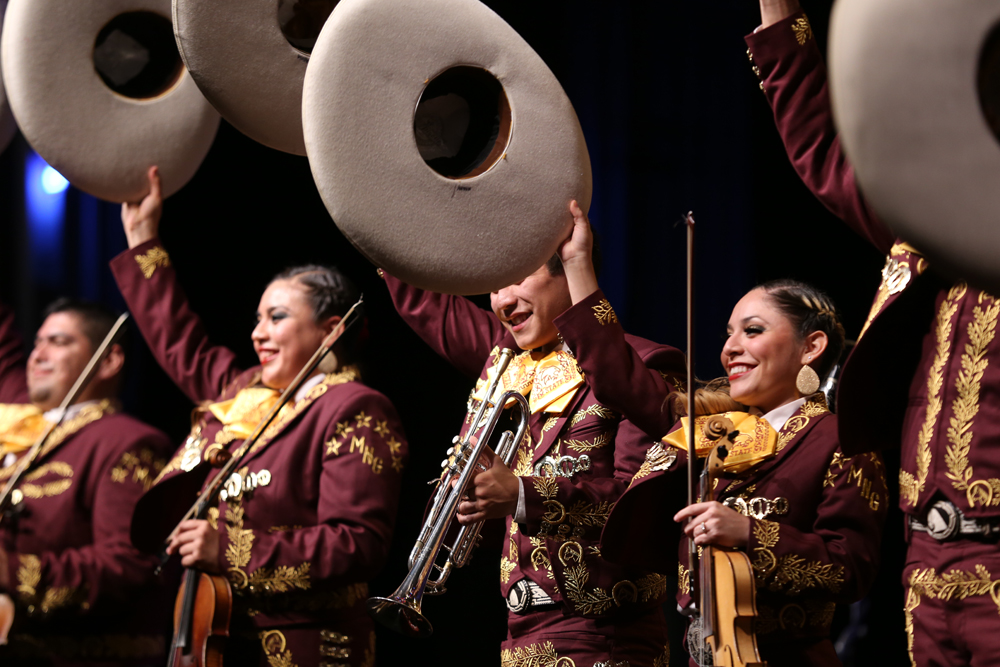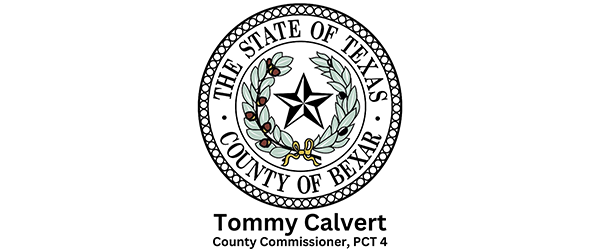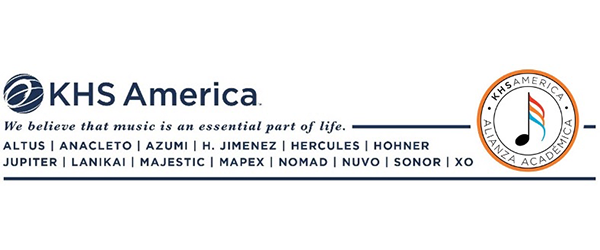- Mexico City musicians’ union mariachi school closes its doors
- NYC Mariachi Conference promotes Mexican culture in New York
- Albuquerque celebrates another successful Mariachi Spectacular
- Guadalajara hosts two mariachi “Encuentros”
- Plaza Garibaldi protests dismissal of mariachi school director
- San Antonio announces dates for Mariachi Vargas Extravaganza
In this 2008 photo, vihuela students study with José Guadalupe Alfaro
at the now-defunct Mexico City musicians’ union’s mariachi school
Last April, the mariachi school of the Mexico City musicians’(Sindicato Único de Trabajadores de la Música del Distrito Federal) closed its doors until further notice. When it was inaugurated in 2008, the union’s Diplomado de Mariachi program was considered a major step forward for mariachi education in Mexico, as it was the first degree program of its type in the nation. Up to 180 students were enrolled at the school’s height.
When the Escuela de Mariachi Ollin Yoliztli en Garibaldi was inaugurated in 2010, however, enrollment at the musicians’ union school began to decline. “Location is key,” says the program’s guitarrón instructor, Marco Antonio de Santiago, explaining that the new school is located in Plaza Garibaldi—the capital city’s heart of mariachi activity—while the musicians’ union’s facilities are located 9 miles away, on the southern edge of town.
Four teachers from the musician’s union mariachi school in 2008:
Juan Carlos Navarro (Mariachi 2000), José Guadalupe Alfaro (Mariachi Águilas de América), Javier Carrillo (Mariachi Águilas de América), and Marco Antonio de Santiago (Mariachi Juvenil Tecalitlán).
“Tuition has a lot to do with it as well,” asserts Santiago. “We were charging 1000 pesos a month, whereas they charge only 600 pesos for the entire school year!” The reason behind this, he explains, is that the Garibaldi school receives government subsidy, something the musicians’ union was never able to obtain. “When our school first opened, we submitted an application to the Secretariat of Public Education to have our degree program certified. But there’s a lot of red tape involved, and we have yet to receive that certification. Without it, we don’t qualify for any government subsidies. So we’re in kind of a Catch-22 situation. If the certification ever comes through, we’ll consider re-launching our program.”
“But even if the certification is never approved,” concludes Santiago, “I believe that we’ve completed an historically important mission. We brought national attention to the issue of mariachi education, helped dignify the genre, and produced many fine mariachi students.”
The third annual New York City Mariachi Conservatory Conference took place June 15-22, 2014. The event was hosted by the New York City Mariachi Conservatory, a program that gives weekly mariachi workshops to a diverse group of ages and ethnicities. This relatively small conference, held in a part of the country not normally associated with mariachi music, is evolving into a New York City tradition.
About 125 students participated in this year’s mariachi workshops. Other conference events included a vocal competition, a mariachi Mass, and interactive demonstrations in local schools. The six vocal competition winners were awarded scholarships ranging from $100 to $350. I also gave an audiovisual presentation illustrating Pedro Infante’s contributions to mariachi music. The main concert, held at the Brooklyn Music School Playhouse, featured an all-star ensemble with Mariachi Tapatío de Álvaro Paulino as its core, reinforced by workshop instructors Arturo Pasalagua (Mariachi Cobre), Alberto Jiménez (Mariachi Divas), Mario and Pedro Hernández (formerly of Sol de México), and Eddy López (UTPA Pan-Am). Workshop students also performed, accompanying workshop vocal instructors Irma Infante (daughter of Pedro Infante) and her husband, songwriter Nicolás Urquiza.
Workshop students back Irma Infante at New York City concert
This unpretentious event gives an important boost to Mexican culture in the New York area, and exemplifies the mariachi world’s continuing expansion. Conference director Álvaro Paulino expects next June’s NYC mariachi conference to be even more successful.
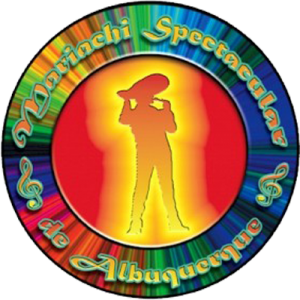
Albuquerque, New Mexico’s 23rd annual Mariachi Spectacular was held July 9-12. Over 500 individuals and 27 groups registered for the three-day workshops directed by maestro Rigoberto Alfaro, and taught by a distinguished staff of mariachi musicians from the U.S. and Mexico (see Mariachi Spectacular de Albuquerque website for details).
Of the 12 groups that competed in the Showcase Competition, the overall winner was Mariachi Estrellas de Chula Vista, from San Diego, California. That group, led by Mark Fogelquist and featuring guest trumpeter Alex González “El Mantecas,” opened the main concert at Sandía Casino, which presented highly inspiring performances by headliners Mariachi Mujer 2000 and Mariachi Sol de México. Guest vocalist Juan Valentín, masterfully accompanied by University of Texas Pan-Am’s Mariachi Aztlán, proved he could still sing his signature rancheras as well today as he did back in his heyday.
First-place winners Mariachi Estrellas de Chula Vista pose with
Federico Torres, José Hernández, and Rigoberto Alfaro
Since the early 1990s, Mariachi Spectacular de Albuquerque has been known for consistently bringing more legendary mariachi pioneers to their events than any other U.S. mariachi conference. This year’s inductee into the festival’s unique Mariachi Hall of Fame was trumpeter Federico Torres, a 48-year veteran of Mariachi Vargas de Tecalitlán.
Guadalajara is the home of two yearly mariachi Encuentros. The best known of these is the Encuentro Internacional del Mariachi y la Charrería, organized by the Guadalajara Chamber of Commerce. This event, founded in 1994, has scheduled a series of gala concerts at the Teatro Degollado from August 28 to September 5, featuring Mariachi Vargas de Tecalitlán, Mariachi Nuevo Tecalitlán, Mariachi Los Camperos de Nati Cano, and Mariachi de América de Jesús Rodríguez de Híjar, along with the Orquesta Sinfónica de Jalisco, and guest vocalists. The participation of mariachi groups from Argentina, Aruba, Australia, Belgium, Canada, Colombia, Costa Rica, Chile, Croatia, Cuba, Ecuador, France, Italia, Japan, Panama, Peru, United States, and Venezuela has been confirmed, and many events are yet to be announced. Keep checking http://www.mariachi-jalisco.com.mx for updated information.
Whereas the Encuentro Internacional features contemporary mariachi groups, the Encuentro Tradicional de Mariachi showcases lesser-known mariachi traditions that represent earlier historical periods and diverse geographical regions of Mexico. The main criteria that groups must meet in order to participate are that they don’t use a trumpet, don’t wear a contemporary mariachi uniform, and don’t play modern genres. The current festival was inaugurated in 2002 by Ignacio Bonilla Arroyo, director of Jalisco’s Secretariat of Popular Culture, who continues to direct this event.
Some of the highlights of this year’s celebration, held August 17-24, include a three-day symposium on the transmission of mariachi music, a two-day colloquium on diverse aspects of mariachi research, a photographic exhibit, book and CD premieres, fandangos, concerts, and live theatre performances. The Encuentro Tradicional’s Facebook page will soon include a complete program of events.
Director Leticia Soto with students at Plaza Garibaldi school
Many mariachimusic.com readers are already familiar with Leticia Soto and her outstanding work. A Mexican American from the Los Angeles, California area, Leti has been a mariachi violinist for most of her life. She is about to receive her Ph.D. in ethnomusicology from the University of California at Los Angeles (UCLA), where she played with Mariachi de Uclatlán as an undergraduate. Since 2012, she has been director of the Escuela de Mariachi Ollin Yoliztli en Garibaldi.
Plaza Garibaldi’s mariachi school, inaugurated in 2011 under a non-mariachi-oriented administration, got off to an extremely shaky start, and the mariachi world initially considered it lost to other interests (see related story). A year later, in an ironic about-face, Mexico City authorities put the mariachi school into the able hands of Leticia Soto, who proceeded to do an exemplary job of tailoring its offerings to reflect the needs and desires of the mariachi community. During the two years she has directed the school, among her other accomplishments, Soto has established a highly successful, solidly mariachi-oriented program, recruited a distinguished staff of mariachi teachers, and has built a strong relationship with the surrounding mariachi community, with which she and the school have great credibility.
Earlier this month (July 2014), without explanation and for ostensibly political motives, Soto’s boss, Ricardo Fuentes, asked for her resignation. When she complied and submitted her resignation letter, however, her school’s teachers, students, the Mexico City mariachis’ union, and the local mariachi community launched a protest to have her reinstated. Further developments on this controversial story will be posted on mariachimusic.com/blog.
Students from Texas State University participate in the
19th annual Mariachi Vargas Extravaganza
The Mariachi Vargas Extravaganza, one of the nation’s largest and longest running mariachi festivals, will celebrate its 20th anniversary November 16-22 in San Antonio, Texas. This weeklong celebration presents the very best in mariachi music, and is filled with unique events, including special tributes to musicians who have made lasting contributions to the mariachi tradition. Mariachi students from all over the nation convene to study with Mariachi Vargas de Tecalitlán and participate in highly competitive mariachi group and vocal contests. The Extravaganza culminates with a gala Mariachi Vargas concert slated for November 22 at San Antonio’s Lila Cockrell Theatre. Tickets for the concert are available through Ticketmaster.com starting September 1. Visit mariachimusic.com for a complete schedule of events.

